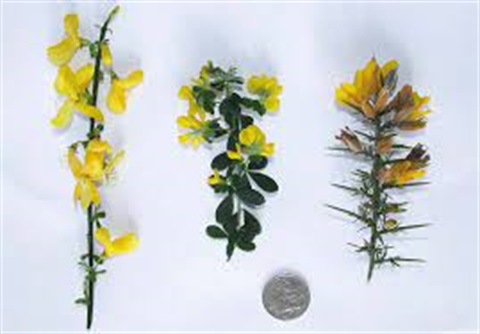Weed of the Week: Broom & Gorse

Snowy Monaro Regional Council is calling on all community members to get to know our region's weeds so we can all play our part in protecting our environment, helping our farmers and supporting our community.
With more rain over the past week and spring weather continuing to warm up, weeds on farms and in gardens continue to flourish across the Snowy Monaro.
The impact of weeds on our community can be devastating and is estimated to cost the NSW economy about $1.8 billion annually (NSW Department of Industry, 2018).
This is the fifth article in our Weed of the Week series, where we'll be sharing information on our region's priority weeds, this week focusing on Scotch/English Broom, Cape Broom and Gorse – all three are weeds of national significance.
What are these weeds?
Scotch/English Broom (Cytisus scoparius), Cape Broom (Genista monspessulana) and Gorse (Ulex europaeus), were first introduced as garden plants but now present serious agricultural and environmental problems.
Gorse is one of the worst weeds in Australia because of its invasiveness, ability to spread, and its adverse economic and environmental impacts. Gorse leaves form a sharp needle-like spike, making contact with them very unpleasant. Gorse is not a well-established weed within the Snowy Monaro region, with infestations being restricted to only a small number of sites. As such, containing its spread is a high priority and affected landowners are expected to maintain a thorough control program to protect the broader community.
Scotch/English Broom and Cape Broom will smother desirable vegetation, which reduces pasture-stocking rates. They form dense thickets, which can block access by humans and stock but harbour feral animals such as rabbits, foxes and pigs. Seeds of Broom are poisonous if eaten in quantity and leaves may cause digestive problems in horses. A mature infestation produces up to 50,000 seeds per square metre making effective control costly and difficult if the plants establish.
Why are these weeds a problem?
- Seeds spread easily through soil, water, machinery, footwear, stock and wildlife
- Plants live for up to 25 years
- Each plant produces thousands of seeds per year
- Plants shoot their seeds metres away, allowing infestations to thicken and spread quickly
- Can dominate pastures, waterways and creek lines
- Obstruct access, reduce pasture availability and provide shelter for pests
- Compete with native vegetation
What can you do?
- Learn to identify broom and gorse
- Search your property for any sign of this priority weed
- Contact Councils biosecurity team for assistance and advice
Download the free NSW WeedWise app for detailed information on how to identify and manage local priority weeds. Visit www.dpi.nsw.gov.au/biosecurity/weeds
Visit Council's website to understand how we can help you with weed management. www.snowymonaro.nsw.gov.au/Environment-Waste-and-Weeds/Biosecurity-and-Weeds






